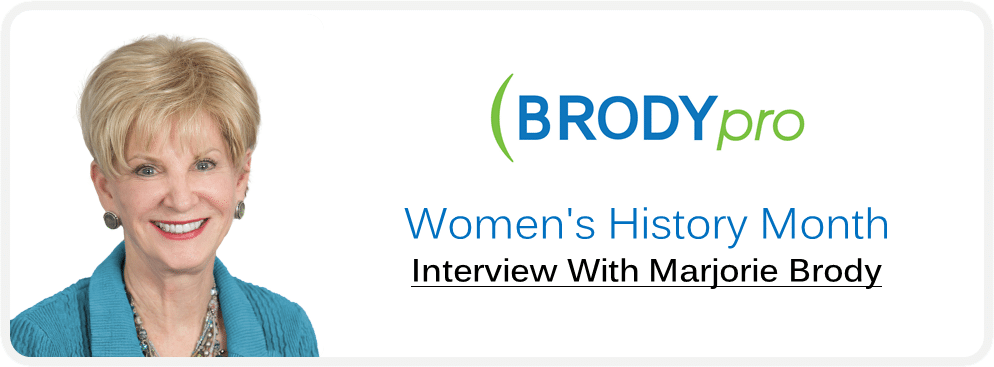Launching a business is not for the faint of heart; especially for a woman in the early ’80s. Marjorie Brody founded Brody Communications Ltd. in 1983 and developed it into an international training and coaching company that partners with many of the most well-known names in pharma/biotech. BRODY also serves organizations in technology, financial services, insurance, the nonprofit sector, and government.
In recognition of Women’s History Month, I sat down with Marjorie to talk about her path to entrepreneurship as well as her beliefs on what still needs to change to achieve gender equality in the workplace.
Q: What did you do before starting BRODY Professional Development?
A: Before, and as I was starting the business, I was teaching at Bucks County Community College. I was there for 23 years, moving from Instructor to Senior Associate Professor and ultimately Chair of the Speech Communication Department.
Q: How did you get started working at Bucks?
A: I graduated college in 3 years and got married. Then I went to Temple University and got a Master’s degree in a year and a half; so I was 22 years old. I applied to teach at 28 colleges in Philadelphia and got rejections from all of them except for one: Bucks County Community College. The college was only 4 years old at the time. When I went for my interview, I had long blond hair which I pulled back to look more professional. I also wore a suit with a skirt that went to the middle of my thigh. I found out later that the man who interviewed me had hired a number of women—and I would have made more than $7500/year if I had worn a shorter skirt.
Q: What challenges did you face in your job at the university?
A: My first department chair, David R., believed that women should be at home raising babies, as his wife was. He gave me such a hard time. The English department kept saying, “Why don’t you work for us?” I didn’t want to work for the English department—but he really wanted to get rid of me.
One year he gave me a choice. It was time for me to get promoted and to get tenure. One had nothing to do with the other; I was eligible for both. He made me choose. I chose tenure because I knew it would give me job security, but not getting the promotion that year impacted the pension I would get, which is still impacting me to this day—every month. In time I was able to rally the rest of the department to oust David, and I became the Department Chair.
Another situation related to getting my PhD. I had started going for my PhD at Temple University about 2-3 years into teaching at Bucks. When it was time to make a decision about my dissertation topic, I went to my advisor and told him that I wanted to take what I was doing into business. He pointed his finger to a chair and said, “Honey, sit.” I sat. He said, “There is no way a man would listen to you in business.”
The problem was, I listened.
Since I didn’t think I could go into business, I decided I wanted to teach as opposed to publish. Bucks was a place to do that. At community colleges they did not expect publishing the way they did at the universities. If I had gone on with my PhD, the only schools that would have hired me were Temple and Penn, so I dropped out of my PhD program ABD (all but dissertation).
Q: What made you decide to start your own business?
A: I started to do training and coaching within organizations through the college initially. They contracted their professors to do these programs. That’s when I realized I loved business. I love people that appreciate what I do and pay for it! I realized I could be doing this on my own too. I had been working for 23 years and I was making $45,000 a year. I made more training and coaching part time than I did with my full-time job. I did both for six years. Then I decided to take the leap and go full time with training and coaching.
Q: What factors contributed to your success building the business?
A: I loved the teaching part and I loved the marketing/selling part. I was also clear about what I wasn’t good at doing and brought people in to help in those areas. I was able to connect my passion with my abilities. Women are often hesitant to ask for money or push to get paid what they’re worth. You need to be able to look people in the eye and say, “This is what I’m worth.” As a woman, I wasn’t afraid. If someone was surprised about my fee, I told them, “The hour is free. The day is free. The fee is for everything that got me to this day.”
Q: What changes have you seen in workplace gender equality? What still needs to change?
A: More women are being seen in higher positions. The President said we needed to have a black woman for VP and Supreme Court. But we don’t have it as much outside of politics—in industry. It’s very slow to change. We need to get representation everywhere. Enough college presidents, CEOs, boards of directors with women… It’s still an all-boys club; a white boys club. A few women do reach the highest levels of industry—and when they fail it’s awful. It’s made into a bigger deal, as if they’re representing all women, and that’s a shame. The fact that you have to ask that question is telling. It should be a non-discussion. We shouldn’t have to think about it, but we do.
What’s your story?

